42+ Sample Audit Questionnaire Templates
-
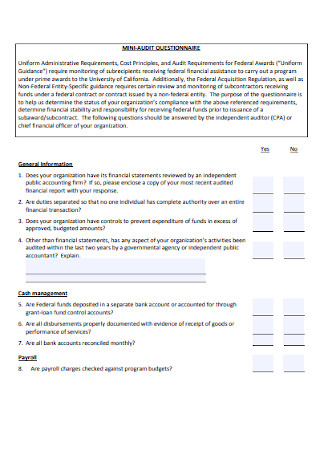
Mini Audit Questionnaire
download now -
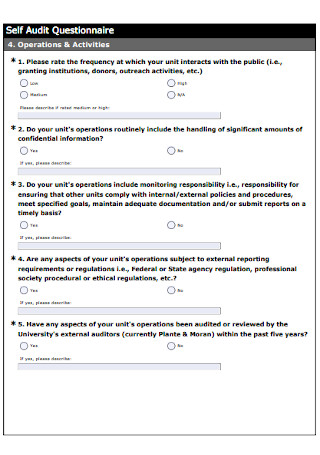
Self Audit Questionnaire
download now -
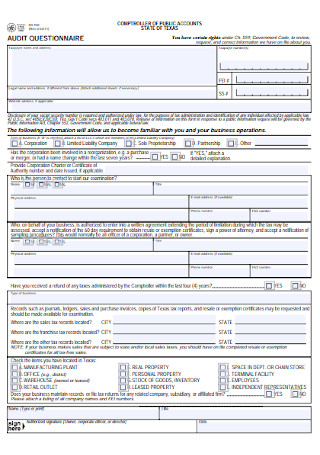
Account Audit Questionnaire
download now -
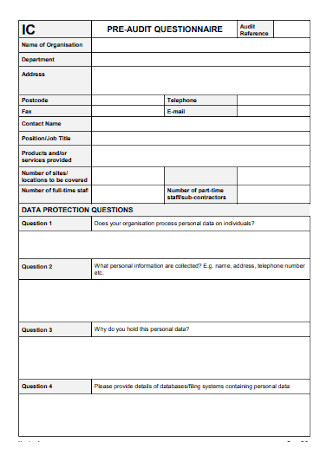
Pre Audit Questionnaire
download now -
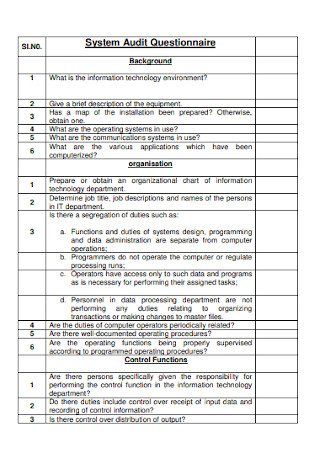
System Audit Questionnaire
download now -
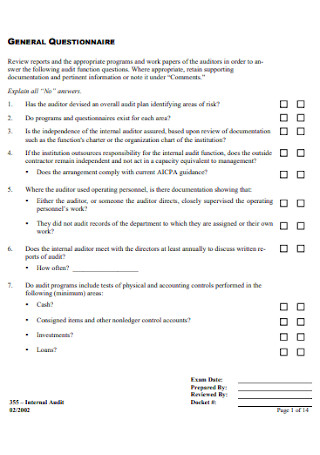
General Audit Questionnaire
download now -
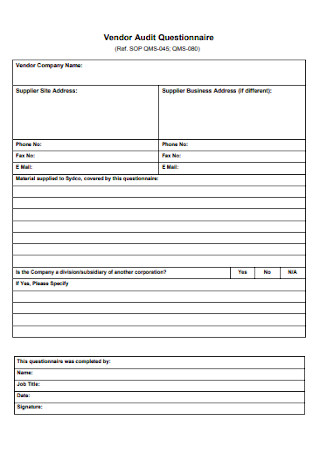
Vendor Audit Questionnaire
download now -
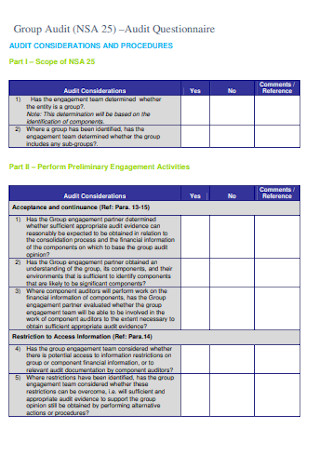
Group Audit Questionnaire
download now -
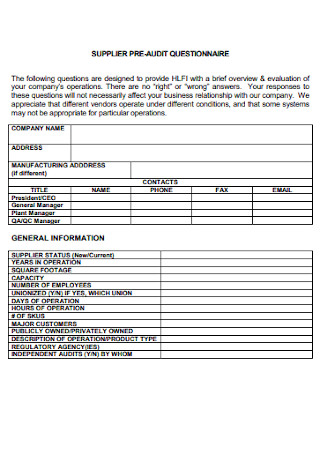
Supplier Audit Questionnaire
download now -
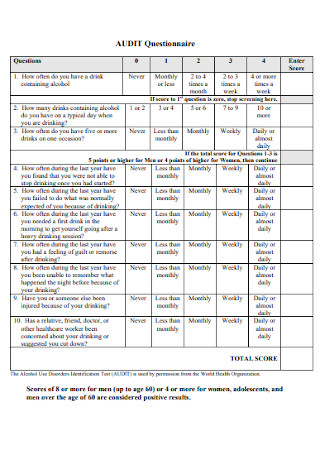
Sample Audit Questionnaire
download now -
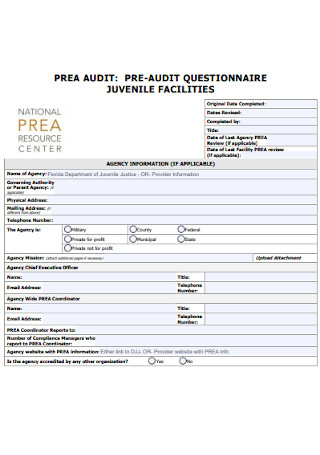
Agency Audit Questionnaire
download now -
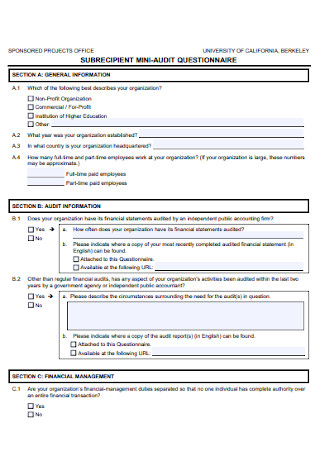
Subrecipient Audit Questionnaire
download now -
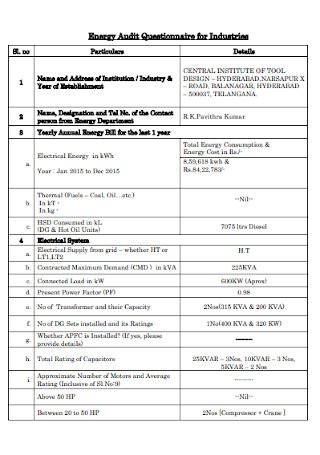
Audit Questionnaire for Industries
download now -
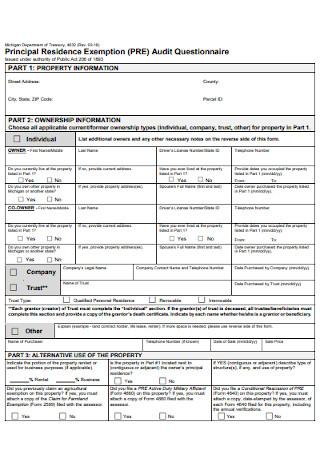
Principal Exemption Audit Questionnaire
download now -
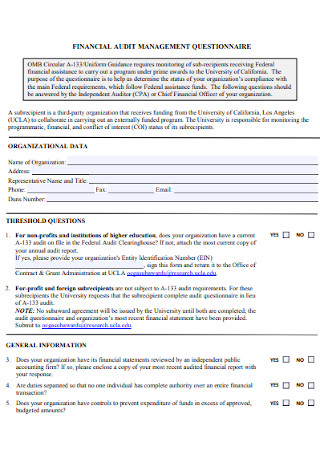
Financial Audit Management Questionnaire
download now -
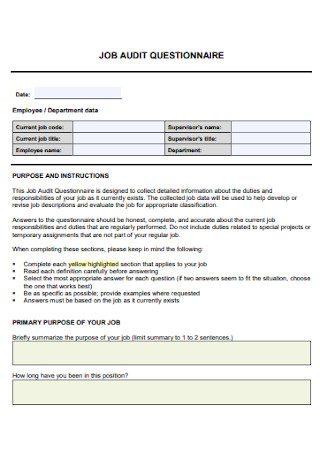
Job Audit Questionnaire
download now -
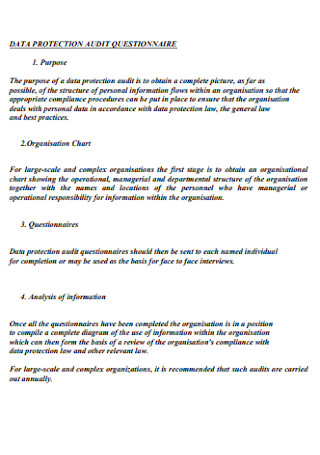
Data Protection Audit Questionnaire
download now -
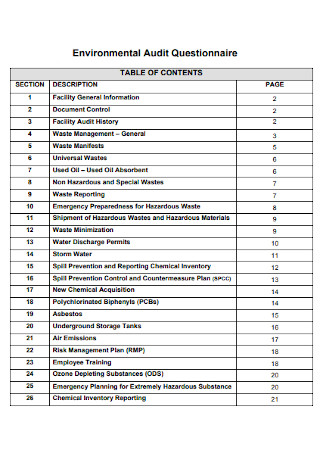
Environmental Audit Questionnaire
download now -
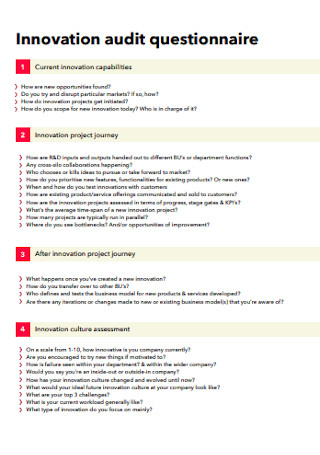
Innovation Audit Questionnaire
download now -
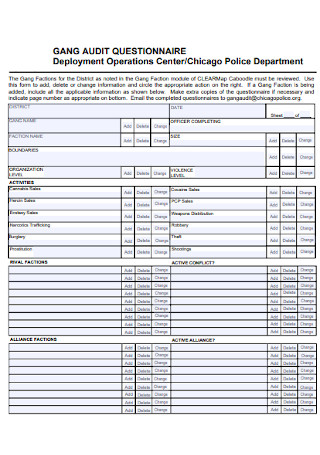
Gang Audit Questionnaire
download now -
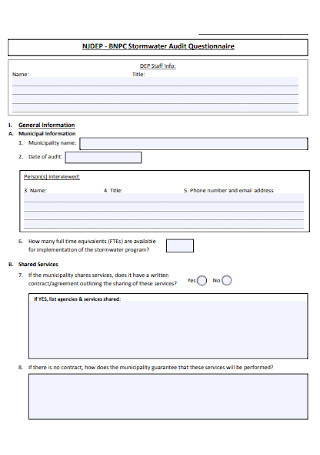
Stormwater Audit Questionnaire
download now -
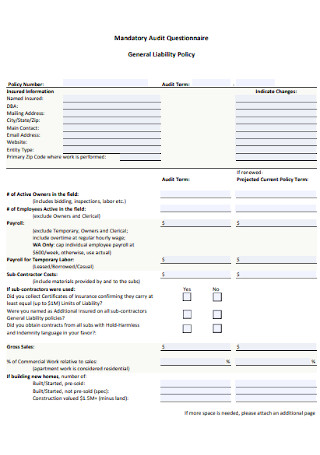
Mandatory Audit Questionnaire
download now -
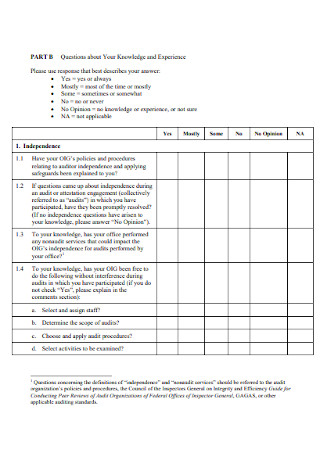
Optional Audit Staff Questionnaire
download now -
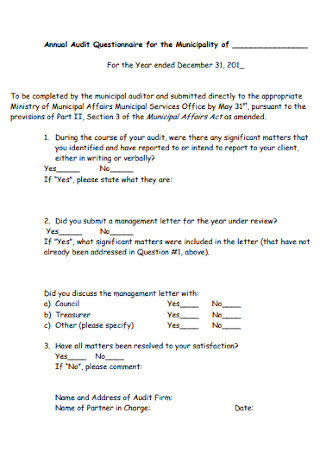
Annual Audit Questionnaire
download now -
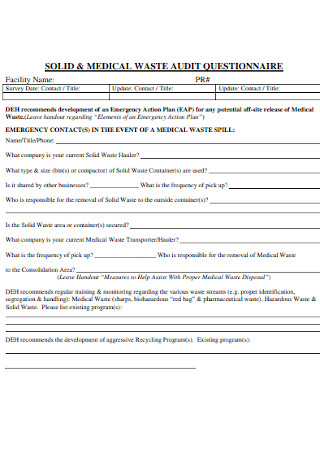
Medical Waste Audit Questionnaire
download now -
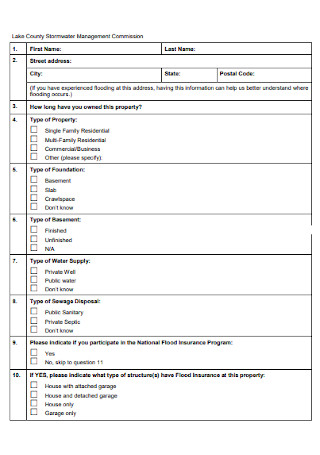
Flood Audit Questionnaire
download now -
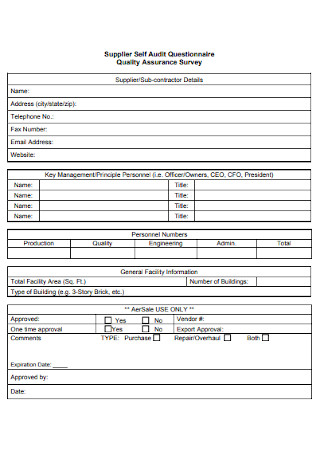
Supplier Self Audit Questionnaire
download now -
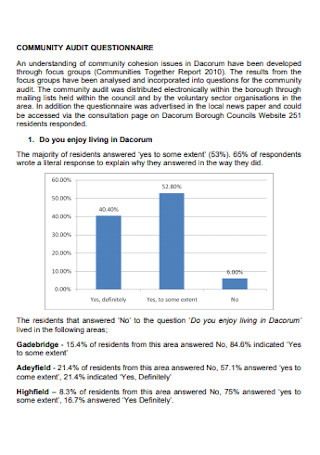
Community Audit Questionnaire
download now -
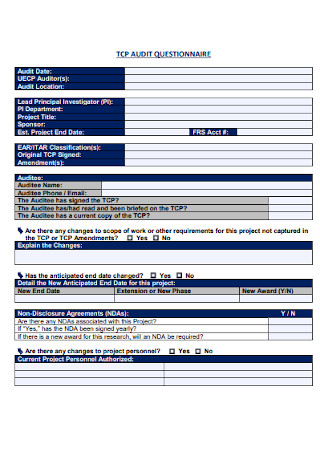
University Audit Questionnaire
download now -
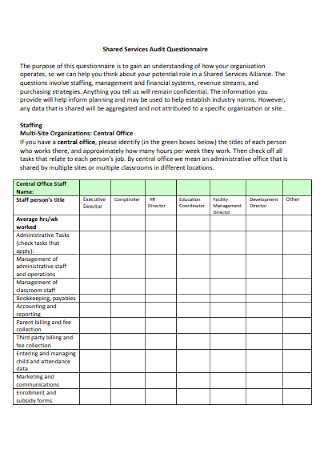
Shared Services Audit Questionnaire
download now -
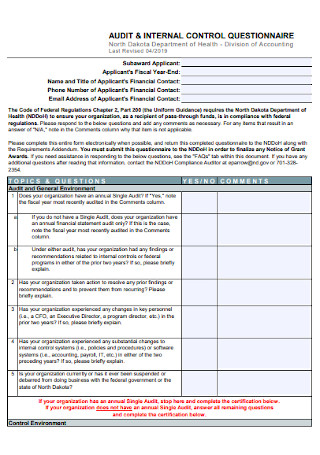
Audit Internal Control Questionnaire
download now -
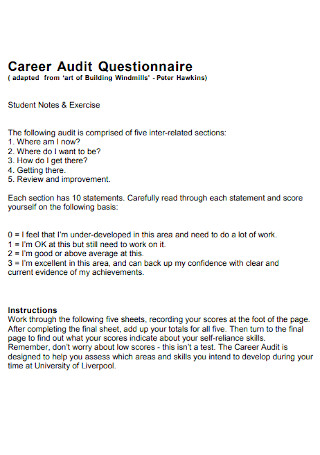
Career Audit Questionnaire
download now -
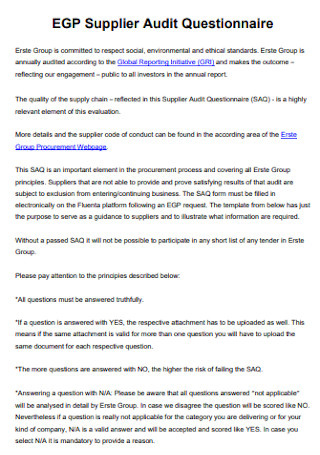
Supplier Audit Questionnaire Example
download now -
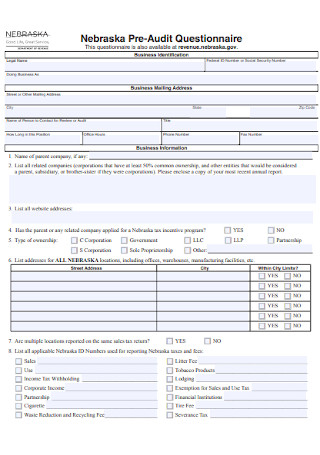
Pre-Audit Questionnaire Format
download now -
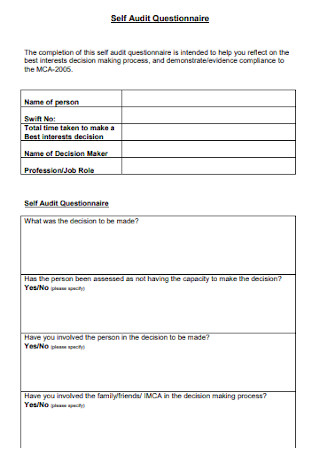
Self Audit Questionnaire Example
download now -
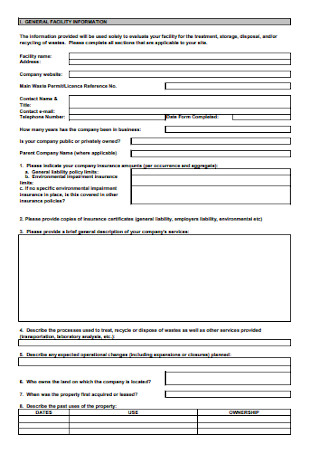
Waste Facility Audit Questionnaire
download now -
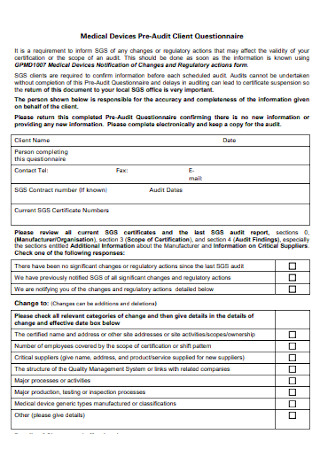
Audit Client Questionnaire
download now -
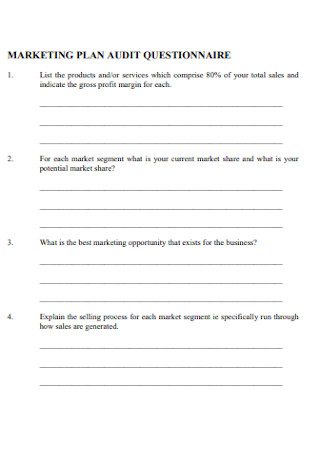
Marketing Plan Audit Questionnaire
download now -
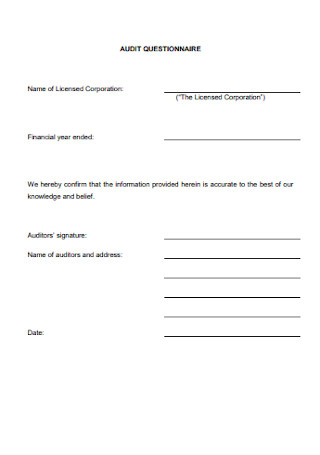
Simple Audit Questionnaire Template
download now -
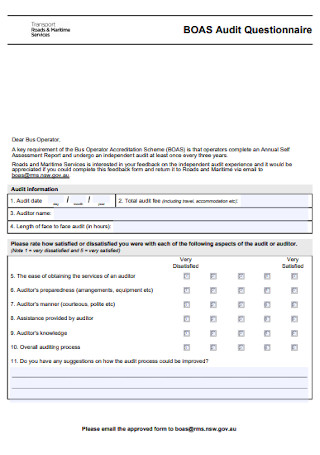
Transport Audit Questionnaire
download now -
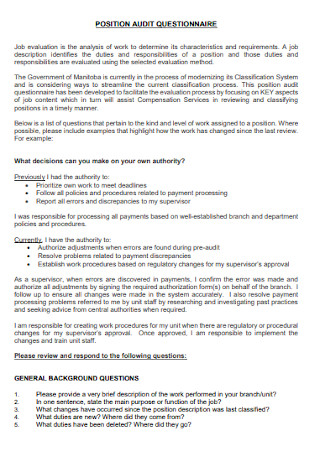
Position Audit Questionnaire
download now -
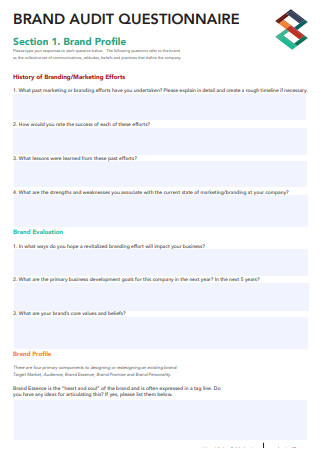
Brand Audit Questionnaire
download now -
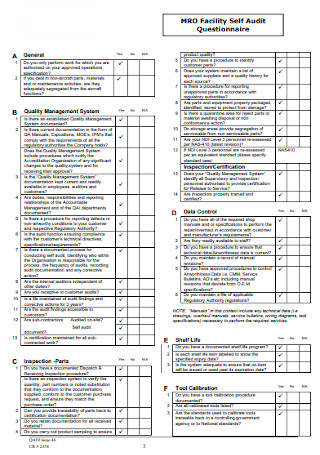
MRO Self Audit Questionnaire
download now
FREE Audit Questionnaire s to Download
42+ Sample Audit Questionnaire Templates
What Is an Audit Questionnaire?
Audit Checklist: The Elements of an Audit Questionnaire
How to Make an Audit Questionnaire
FAQs
What are the main audit sections?
What are the different types of audits?
How did the concept of auditing begin?
How often should audits happen?
What Is an Audit Questionnaire?
In 2019, about 1.4 million accountants and auditors worked in the US. That is, according to the Bureau of Labor Statistics (BLS). And their roles in auditing are crucial, especially in managing financial records and examining an organization’s operations’ totality. Thanks to the auditing process, organizations gather helpful insights from careful evaluations and provide better operations or services. With an audit questionnaire prepared, it will be easy to ask questions and gather answers to benefit the overall management system. So, audit questionnaires contain the questions, criteria, and important factors to conduct audit or maintenance. And as you collect data, you slowly develop smart business-driven decisions.
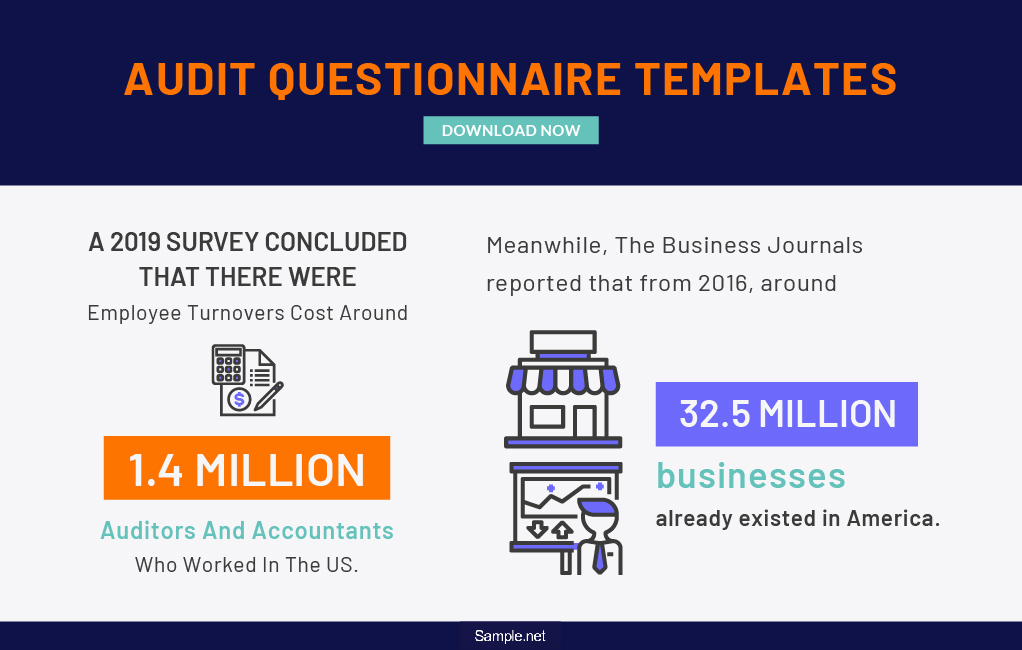
A 2019 survey concluded that there were 1.4 million auditors and accountants who worked in the US.
Meanwhile, The Business Journals reported that from 2016, around 32.5 million businesses already existed in America.
Why Are Audit Questionnaires Important?
Audit questionnaires are reliable in terms of monitoring. How else can you know if there were unattended issues left at work without auditing in the first place? So, expect the questionnaire to be more than just a list of questions to ask. It also collects answers for analysis, evaluation, self-assessment, and conclusion. Practical solutions would surely make a difference that would lead to implementing a better reputation for your business. What is even better? An audit questionnaire is ready for customization. You can use customized questions, criteria, format, and design that fit well to your purpose in auditing.
Also, auditing, in general, works for many applications. You can monitor operations in the school, hotel, restaurant, warehouse, etc. And you may cover a variety of factors to evaluate from staff communication, business compliance, and more. Thus, there is no need to use the same audit questionnaire for every audit because there are different facets to study, analyze, or evaluate. Just be sure to set the questionnaire strategically where results would be worth it in the end.
Audit Checklist: The Elements of an Audit Questionnaire
Do you already have any idea what consists of a standard audit questionnaire? If not yet, then never fret because we got you covered. We outlined your official audit checklist as your guide in recognizing every element in an audit questionnaire. And the elements consist of the following:
How to Make an Audit Questionnaire
In 2016, nearly 32.5 million businesses already existed in America. Imagine how many businesses there are right now—surely, a lot more. And do you think each enterprise would last long without auditing as part of their management plans? Definitely not. Audit plans aim to prevent failure as much as possible. If handled correctly, rest assured the results are satisfying. So, it would be best if you learned how to create an effective audit questionnaire. You already learned the questionnaire’s definition, importance, and elements. And you are surely ready to create one. Without further ado, here are steps of how to make an audit questionnaire:
Step 1: Understand the Areas to Audit
First things first, what department or area is under audit? Are you auditing your company’s recruitment process, overall quality service, or the office environment? Whatever the areas and functions to focus are, note them down. Those subjects will be what you base your audit questionnaire later on. And this step brings us back to discussing the elements earlier where you should consider your audit’s purpose before auditing. That way, you have a clear vision of what to conduct.
Step 2: Tailor the Audit Questionnaire to Your Purpose
Based on the areas to audit, use those factors in making the questionnaire. Find a template from our sample audit questionnaires and lay it out according to your purpose. The factors inside the questionnaire should be tailored according to what your organization needs. A tip is to conduct an audit needs analysis to know what specific aspects must be audited from your organization. Thus, you can provide a smart plan for the audit next. Once you specify the audit questionnaire according to your enterprise’s audit needs, providing the questions and criteria would run smoothly.
Step 3: List the Criteria and Questions in a Template
Fill in the audit questionnaire template with the basic details until you slowly jot down the appropriate criteria and questions. Focus on the word ‘appropriate’ because maybe your audit’s purpose is to monitor a school’s unit plan system. Yet, you ended up listing questions about the school’s expenses. That is one example of an audit questionnaire that is irrelevant to its purpose. Also, arrange the details in the proper sequence. Find a way where the queries enlisted have a smooth flow when asking. And this step helps set an organized questionnaire.
Step 4: Finalize the Format and Design
It is no surprise that you must mind your audit questionnaire’s format, design, style, and overall content. The presentation also contributes if the questionnaire is hard or easy to follow. Check if the font style and font size are legible enough. Or perhaps, find ways to shorten long sentences and paragraphs. Making it brief is much better. Indeed, a professional design is imperative, but there is room for creativity too. And that is up to your ideas on how to apply it to the questionnaire.
Step 5: Use the Questionnaire and Check Its Performance
Are you satisfied with your questionnaire? Launch it now. And while using the audit questionnaire, observe its performance. If it is making things effortless, then you made it well. Create adjustments if there are factors that made the process slightly time-consuming or challenging for you. There is room for feedback on how the process goes anyway. And aim to update the questionnaire regularly, especially in every audit. Expect to improve for the future audits as you master how to make and conduct the auditing process.
FAQs
What are the main audit sections?
Generally, an audit consists of three main sections. They are management, finance, and operations. And each aspect plays a crucial role in coming up with a successful audit or assessment.
What are the different types of audits?
There are three main types of audits. Based on Investopedia, these types are the internal, external, and internal revenue service (IRS) audit. Expect each class to help shape an efficient and effective auditing process for any organization.
How did the concept of auditing begin?
History states that the auditing process goes way back—the 15th Century. By that time, every royal and merchant identified approaches to alleviate theft, authority abuse, or fraud. Approaches include questioning, verifying, and determining issues. And that started the need to audit until solutions come up to prevent problems in any business.
How often should audits happen?
Bear in mind that an audit is not a single-time approach. According to ISO Update, it should be done regularly, specifically, per month, quarter, year, or twice a year. And it depends on your organization on how often or needed it is.
So what can auditors use to plan a more comprehensive and effective scope for audit projects? Audit questionnaire. Keep in mind that auditing takes plenty of time, resources, and effort to conduct. Why settle for difficult auditing when you can make your audit program without even starting from scratch? Audit questionnaire templates are pre-formatted, fillable, and easy to edit; therefore, making it easy to engage in the audit work strategically. Lastly, remember that auditors’ results and recommendations may bring a satisfying impact to exhibit positive changes in your organization.
